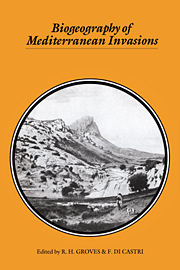Part III - Biogeography of taxa
Published online by Cambridge University Press: 02 December 2009
Summary
Some plants of the Mediterranean Basin have been introduced, either deliberately or accidentally, to the four other regions of the world with mediterranean climate, where many of them have flourished and some have become weeds. Other plants originating in one of these other regions have been introduced to the Mediterranean Basin where they have become established. Thus there have been exchanges in the floras of all mediterranean regions. The following five chapters document the magnitude of these exchanges in higher plants. The exchanges have tended to be concentrated in a few large plant families, of which the grasses, composites and legumes predominate–mainly, no doubt, because of the size and usefulness of these three families for agriculture and horticulture.
A further five chapters describe ecological aspects of some well-documented plant invasions. Mediterranean-climate regions are characterised not only by a certain climatic regime and by the long association with human disturbances described in the previous section, but also by nutrient-deficient soils and by frequent fires. This section concludes, appropriately, with a chapter that challenges the emphasis on a particular climate as the main determinant of invasiveness in mediterranean regions. Other ecological factors interact with a mediterranean climate to influence which plants have become permanent components of the flora of all mediterranean regions. Chance too is a factor in the evolution of all five floras. Many more exchanges are likely in the future, even though the rate of increase in naturalisation may seem to be reducing in some regions of mediterranean climate such as California.
- Type
- Chapter
- Information
- Biogeography of Mediterranean Invasions , pp. 65 - 66Publisher: Cambridge University PressPrint publication year: 1991



